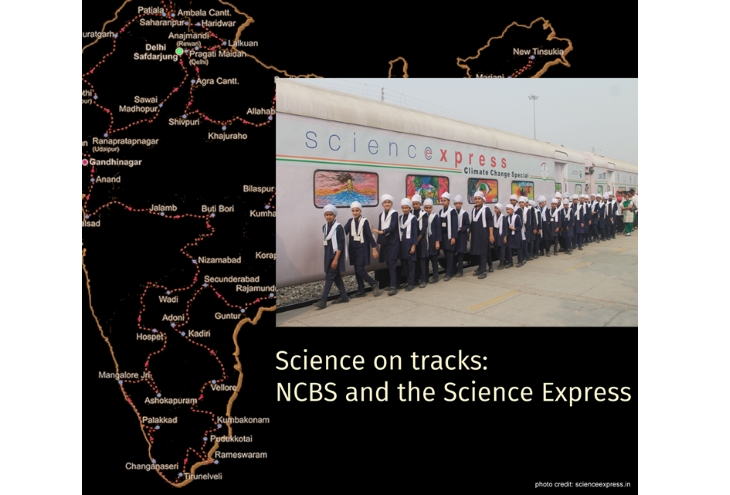A science exhibition on the move? It's a fantastic idea that has been travelling on the Indian railway tracks for seven years. The Science Express is a unique moving science exhibition mounted on a 16-coach AC train that was first flagged off in 2007 by the then Prime Minister of India, Dr. Manmohan Singh and German Chancellor Dr. Angela Merkel.
This year, the Science Express was remodelled to reflect a theme centred on climate change and environmental issues. The train now relabelled as the 'Science Express - Climate Action Special' or SECAS began its tour on the 15th of October 2015. Its journey began at the Delhi Safdarjung railway station after a grand flag off by a host of honourable ministers from the present Government of India.
The National Centre for Biological Sciences (NCBS), Bangalore, is proud to be associated with the eighth phase of the Science Express. Within the 9th and 10th coaches, are posters dedicated to the role of biotechnology in understanding bio-resources and nature conservation, which are based on work from NCBS. Tbe posters that describe the use of genetic methods for tiger identification and conservation are based on data and methods developed by Uma Ramakrishnan's group at NCBS. The train also includes posters showcasing collaborative research between groups at NCBS and ATREE (Ashoka Trust for the Environment and Ecology) in the biodiverse Northeastern state of Sikkim. Themes in this effort include studies on pollination, the impacts of climate change on biodiversity and DNA-based tracking of disease-causing plant viruses. One poster elucidates the novel and exciting field of chemical ecology, which explores ways in which organisms use chemicals to communicate with each other and their environment.
"This is a wonderful initiative", says Dr. Olsson, who designed one of the posters. "What a privilege to share the wonder of science with others. I hope that this exhibition will inspire others to explore and preserve the beauty of India's biodiversity".
The initiative to highlight work on tiger populations, biodiversity, climate change and chemical ecology came from the Department of Biotechnology (DBT) through Vigyan Prasar, which contacted Uma Ramakrishnan at NCBS. The information provided by Ramakrishnan's group was used to design posters at the Vikram A. Sarabhai Community Centre at Ahmedabad. The collective effort by researchers and designers resulted in a series of six posters on the Science Express.
Although the idea of travelling exhibits and museums is not a new one, the Science Express has taken this notion to new heights. The exhibition train has covered over one lakh kilometres across India and has received more than 1.33 crore visitors. The Science Express has thus become the largest, the longest running and the most visited mobile science exhibition in India. SECAS is slated to travel across the country for a period of 7 months, and will halt at 64 locations in 20 states ranging from Udhampur in the north to Tirunelveli in the south, while also covering several districts from Gujarat and Rajasthan in the west to Assam and West Bengal in the east.
Through free entry, the exhibition is thrown open to the public as it aims to create awareness and generate dialogue about climate change among various sections of society. One of the central objectives of SECAS is to reach out to students to teach them about the phenomenon of climate change, how it affects lives and the need to mitigate its effects. Through the posters in coaches 9 and 10, the DBT and NCBS hope to spread the message of the fundamental research done here, and how laboratory-based science can be used to understand the natural world better.
"Every Indian loves tigers and is fascinated by the Northeast and its biodiversity. That we, at NCBS can convert this wonder into scientific understanding and then communicate our results to such a wide audience through the science train is amazing! " says Uma Ramakrishnan.
The Science Express is currently in Haridwar as it winds its way across India. Unfortunately, this singular science exhibition does not come to Bangalore, but it does come close sometime in March and April 2016. If you would like to see the Science Express yourself, please visit the Science Express Climate Action Special website for a list of scheduled stops.










0 Comments